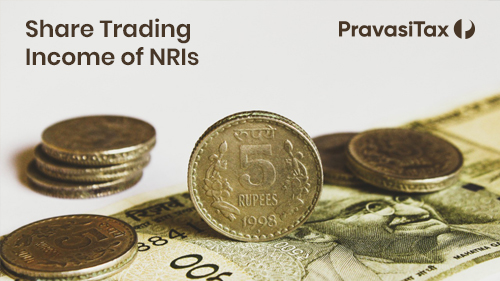Information Hub/Investments/Shares
Share Trading Income of NRIs - Factors Affecting the taxability
Published : 28 Aug 2021
 In case of listed securities, the taxpayer has an option to classify the income from transfer of such securities as business income or capital gains. The taxpayer can suo-moto classify such income as business income and in case of securities held for more than 12 months the same may be classified as capital gains.
In case of listed securities, the taxpayer has an option to classify the income from transfer of such securities as business income or capital gains. The taxpayer can suo-moto classify such income as business income and in case of securities held for more than 12 months the same may be classified as capital gains.
The key factors that would need to be factored for such classification of income from trading in listed securities has been summarised below:
| Particulars | Business Income | Capital Gains |
| Rate of Tax | • Tax is to be paid as per the individual’s slab rate which can range from 5% to up to 30%.
• Person having total income falling in higher slab for tax rate ends up paying more tax if income is disclosed as profits from business | • Short term gains from shares (i.e. held for less than 12 months) is taxed at a rate of 15%. • For securities purchased after 31 January 2018, long term gains exceeding INR 1 Lakhs, arising on sale of such listed securities on which STT is paid, is taxable at 10%. |
| Basic exemption Limit | • In case of individuals, basic exemption of tax can be claimed for total income (Up to INR 2.5 lakhs, 3 Lakhs, 5 Lakhs for up to 60 years, 80 years, 80 years above of age, respectively). | • In case of resident individuals / HUF, no tax on capital gain up to unexhausted basic exemption. However, an NRI cannot avail this exemption. |
| Expense of trading | • All expenses incurred for the business of trading can be deducted from profits including STT. | • Charges on sale excluding STT can only be deducted. |
| Set off losses | • Losses from non-speculative (delivery based) transactions can be set off against any income other than salary in the same year and profits and gains of business and profession in subsequent years | • Loss under head “Capital gains” can only be set off against income from “Capital gains”. |
| Carry forward | • Losses from non-speculative transaction can be carried forward for 8 years and speculative transactions for 4 years. | • Losses can be carried forward for a period of 8 years. |
| Audit | • Tax audit is applicable if turnover exceeds INR 5 crores since all receipts would be digital receipts | • Tax audit is not applicable |
| Maintenance of books of accounts | • Book of accounts must be maintained if turnover exceeds INR 5 crores unless presumptive scheme is opted. | • No requirement to maintain books |


